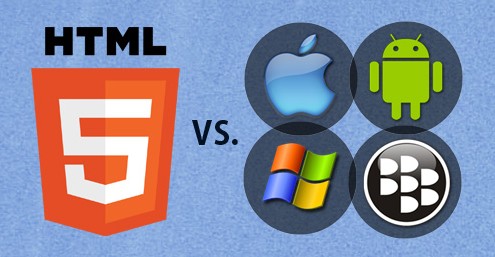The app development approach battle is heating up between native apps and HTML5 web apps. Both have their own advantages and disadvantages, but which is the right development approach for my enterprise is the key question here.
This blog discusses the the factors that will help you to choose a particular way of building your mobile app based on the situation you are in.
Device Functionality
If you are developing a game or your app needs access to sensors, inbuilt hardware like Bluetooth, NFC and the user experience is centered on these elements, then native should be your approach. Even though hybrid approach is tempting for this use case you would end up writing different native code to leverage the device access in the respective platform. This would eventually come to same costs and in some cases higher compared to native and would be slower as well. This would be a double whammy.
On the other hand if the app needs only an occasional access to take a picture or device access is optional in most of the app’s use cases, then it is better to go with hybrid approach so that it might give cost advantage, particularly if the app’s functionality needs to be replicated across different platforms.
Security
If your app needs to cache sensitive data like users’ health data or any other enterprise confidential data, you would need strong encryption capabilities at the device end. Both native and hybrid can fit the bill, but again, in hybrid the effort for implementing the data encryption functionality in native needs to be considered before opting that approach.
Offline Capability
If your app needs only few mega bytes of data to be cached without bothering about security then HTML approach can be considered but if it is data intensive then it would make sense to go with native since there can be significant amount of effort needed to make it work as expected in case of hybrid.
Performance
No guesses here, native would win hands down if performance alone is the criteria but if the content is the main criteria and performance can take a little bit of backseat then go for hybrid. On the other hand if you don’t want your app in the app store then go with pure HTML5 which would be in fact faster than hybrid (this is because your native container’s Javascript engine is inferior to the mobile browser’s Javascript engine).
Content Management
If your app is pure content based, then HTML5 is the ideal choice, the choice to go with hybrid arises only if you want to distribute it to app store.
As you could see the choice of mobile development approach vary based on what do you want to do and not how do you want to do and it’s entirely circumstantial. Let us know what are your priorities and we will help you to land in a right type of mobile app!
For more info contact: [email protected]
- How can a mobile application lower your motor insurance premium and improve safety? - November 18, 2015
- Aspire’s Mobile CoE and it’s focus on Xamarin - October 15, 2015
- Dalvik to ART, Why a change of runtime in Android Lollipop? - January 30, 2015








Comments